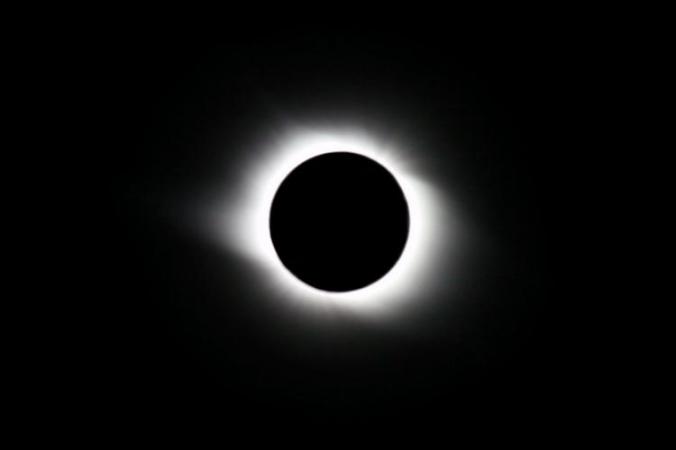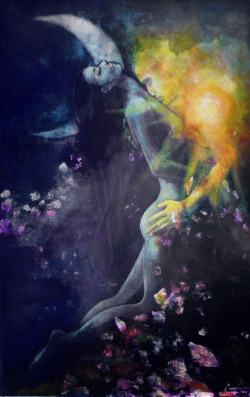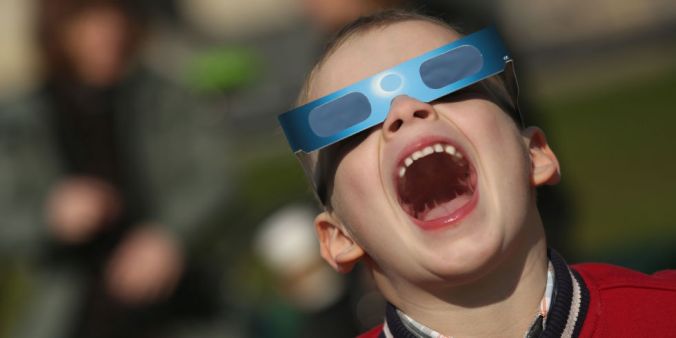
Today most of North America will be plunged in at least partial darkness during the middle of the day, but thankfully the majority of us will be looking at the eclipse of the sun in awe (and wearing proper safety glasses – protect your eyes people!) rather than panicked frenzy.
Solar eclipses have caused fear, inspired curiosity, and have long been associated with myths, legends and superstitions throughout history. In some cultures, they are still considered bad omens, even today.
Of course today we know that a solar eclipse occurs when the moon passes between the Earth and the sun, momentarily blocking out the sun’s light. Ancient civilizations, however, understandably struggled to find an explanation as to why the sun temporarily vanished from the sky, resulting in many myths and legends behind the astronomic phenomena.

In many cultures, the legends surrounding solar eclipses involve mythical figures eating or stealing the sun. For example, in Vietnam, it was believed that a giant frog devoured the sun, while the Vikings blamed wolves. The word for eclipse in Chinese, chih or shih, actually means “to eat” and the ancients there believed a celestial dragon was to blame.

If you hear pots and pans banging together today, you might be in Korea (or your neighbours could be Korean) because in ancient times there, people believed that mythical dogs were trying to steal the sun so they banged their pots to scare the canines away.
 Some cultures have a more romantic take on solar eclipses. Both Australian Aboriginals and the Tlingit people of the Pacific Northwest Coast of North America, believed that the sun and the moon were a man and a woman who were in love and eclipses darkened the world when they came together in order to give them some privacy. Boom-chicka-wa-wa!
Some cultures have a more romantic take on solar eclipses. Both Australian Aboriginals and the Tlingit people of the Pacific Northwest Coast of North America, believed that the sun and the moon were a man and a woman who were in love and eclipses darkened the world when they came together in order to give them some privacy. Boom-chicka-wa-wa!
Other crazy myths associated with eclipses have to do with what happens rather than why. In Transylvanian folk tales, the dew formed during an eclipse was thought to be toxic. Even into the 19th century, some people believed that you shouldn’t breathe outdoor air during an eclipse and laundry left out to dry would be contaminated. Today a quick internet search will result in warnings about “eclipse rays” harming unborn children and people in India fasting due to their belief that food cooked during an eclipse is poisonous and unpure.
Eclipses have also played important roles in literature. Shakespeare mentioned them as bad omens in King Lear and Antony and Cleopatra, John Milton compared the fall of Satan to a solar eclipse in Paradise Lost, and Mark Twain used an eclipse as a pivotal plot point in A Connecticut Yankee in King Arthur’s Court, when the time-traveling Yankee saves himself from execution by making a medieval court believe that he can darken the sun. Even horror writer Stephen King connected two of his novels, Gerald’s Game and Dolores Claiborne, through the solar eclipse that was visible over Maine on July 20, 1963.
Throughout recorded history, eclipses have been blamed for tragedies, wars, disease outbreaks and the deaths of prominent people. In 2009, a financial behaviourist named Gabriele Lepori even discovered that stock prices tend to fall on eclipse days.
Thankfully we are not the Aztecs, who attempted to stave off the end of the world (which they believed would be caused by an eclipse followed by an earthquake) by performing a human sacrifice once a year on the day they expected the solar eclipse. These days we don’t try and prevent eclipses, nor do we have to make up wild stories about their cause. Instead, some die-hards go to great lengths to experience them. Like Alvin Peterson, a navy photographer who spent two hours on top of a flying dirigible with his movie camera to film the eclipse over New York on Jan. 24, 1925. The most impressive and literal example of eclipse chasing occurred on June 30, 1973. Scientists who chartered a supersonic Concorde traveling at 1,250 mph over Africa managed to stay in the path of totality for 74 minutes, at least 10 times longer than anyone could ever see a total solar eclipse from the ground.

Why do people go to these extremes to see an eclipse? Ask ten people you’ll get ten different answers, but for many it’s for the sensory experience and the rare opportunity to see the solar system in motion. It’s that desire to experience the eclipse that will spur millions of people to flood parks, roads, trails and towns along the path of totality today, many traveling for hours or days and paying jacked-up hotel rates to put cardboard glasses on their faces and spend a couple of minutes staring at the sky. I guess maybe eclipses do still make us crazy.

